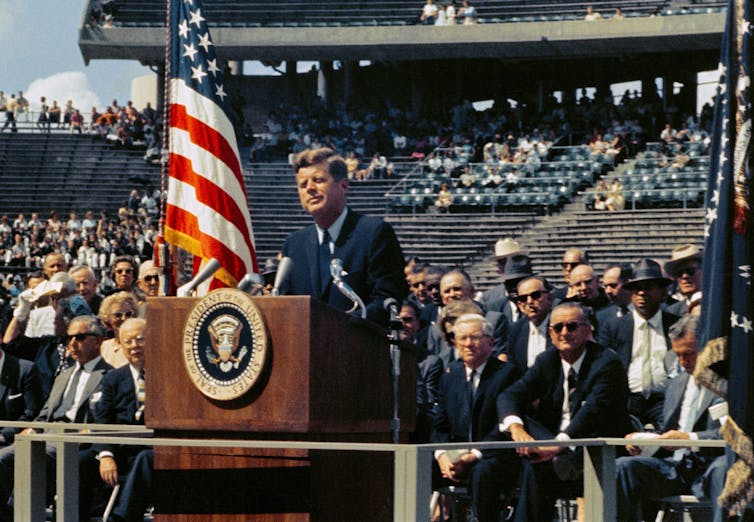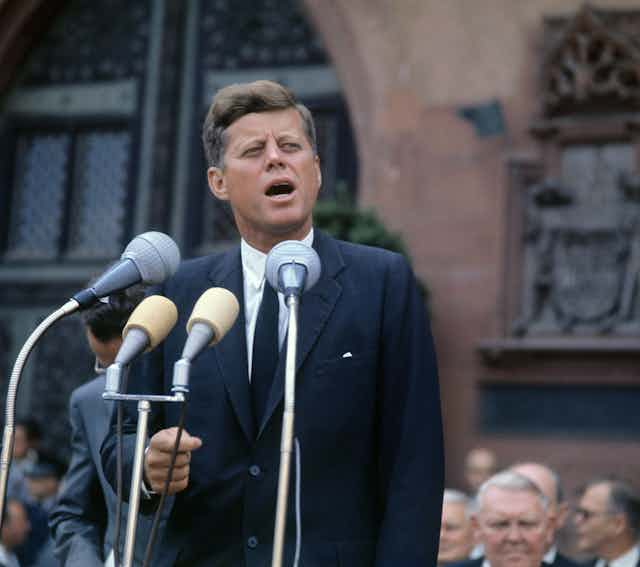John F. Kennedy retains an iconic status as an exemplary – even inspirational – public figure and his leadership approach has been influential for decades.
The former US president (1961-63) projected an idealist image of leadership, which, at its best, demonstrated that the political system can address society’s most profound challenges. His was an optimistic and ambitious presidency that, although tragically cut short, achieved considerable success across a range of activities as diverse as poverty reduction, bans of nuclear weapons testing, and the Mercury and Apollo space programmes.
At 43 when elected in November 1960, JFK remains the youngest president to take the oath of office – and his youth might have been considered as a disadvantage, especially in foreign policy leadership – but he had honed his foreign affairs knowledge to an extent with his very extensive overseas travel during his time in Congress, and during military service. He also appointed an extremely able and highly educated cabinet.
As the 60th anniversary of Kennedy’s death approaches, it’s worth remembering that the Kennedy presidency laid down a marker for ambitious, informed and progressive styles of leadership. Jack, Robert and Edward Kennedy all contributed in various ways to Democratic political causes, such as expanding civil rights and legislating for healthcare reform.
Read more: Romantic heroes or ‘one of us’ – how we judge political leaders is rarely objective or rational
JFK’s leadership style has been hugely influential, acting as a political and cultural model emulated by subsequent presidents as varied as Ronald Reagan, Bill Clinton and Barack Obama. While politically to the right of Kennedy, Reagan (a former actor) arguably shared JFK’s sense of political theatre. Clinton tried to develop a youthful, vigorous and idealistic image modelled after JFK, although many of his attempts to pass legislation contributing to key Democratic goals (such as healthcare reform) ultimately failed. Clinton, like JFK, liked to gather together large groups of intellectuals and leaders in their fields to discuss policies and issues. Obama believed in diplomacy and negotiations, even with adversaries, as JFK did, according to Ted Sorensen, JFK’s former speechwriter.
Kennedy’s open and engaging style made government and public service seem worthwhile and relevant. Methods used to construct presidential “leadership rankings” are often challenged, but JFK has consistently been ranked in the top ten of many, despite having just over 1,000 days in office. The Kennedy family thrived on ambition and power, but their professed duty to serve the public seemed genuine, as did the desire to learn and to do better.
JFK governed from the centre, appointing a cabinet with varied political backgrounds. He had an effective record of passing legislation while in office, and he contributed to the eventual passing of the historic civil rights legislation under his successor, Lyndon Johnson.
In our own archival research, we explored the development of what became known as the Hickory Hill seminars, a series of talks and social gatherings that usually took place at Robert and Ethel Kennedy’s home in McLean, Virginia. The events functioned as a place to explore social problems and their solutions, and as a kind of proto-leadership development seminar. Topics of discussion ranged from great literary works to child poverty. Invited speakers included the environmentalist Rachel Carson, and the philosopher A.J. Ayer. The inner circle of the Kennedy administration would actively engage with external people and ideas, in stark contrast to the partisan, secretive and often walled-off styles of leadership that are so common today.
JFK’s presidency and leadership featured some notable successes. He used the federal government to enforce racial desegregation in several high-profile situations. And his administration prepared the ground for the aforementioned civil rights legislation which was passed after his death. Less positively, the power of Kennedy as a brand was deliberately cultivated and policed by his inner circle. His father crowed about selling Jack’s image “like soap flakes”.
Avoiding groupthink
JFK’s weaknesses as a leader were also substantial. He acquiesced to the disastrous Bay of Pigs incursion, where military experts wrongly predicted that Fidel Castro’s regime in Cuba could be overthrown with ease. JFK learnt a lesson the hardest way possible about accepting military advice. After the Bay of Pigs incident, JFK introduced new ways of working to avoid “groupthink”. His later success in the Cuban missile crisis was partly derived from this lesson.
But Kennedy also deepened the US’s appalling intervention in Vietnam. He subscribed to the “domino theory” about the supposed need for the US to confront communism in Asia whatever the cost. His administration dragged America towards an unwinnable war by propping up the unstable South Vietnam regime, and colluding in a bloody coup against one of its leaders.

Speechwriters and academic historians such as Sorensen and Arthur Schlesinger Jr expended huge efforts in curating and promoting the Kennedy family image as a form of progressive, even heroic, leadership (Schlesinger was in charge of the day-to-day running of the Hickory Hill seminars, and was a key figure in the development of presidential leadership rankings). These efforts surely influenced the depth and longevity of the Kennedy appeal.
There are other connections between JFK and the study of leadership. Leadership theorist James MacGregor Burns wrote a campaign-trail biography of JFK, and Burns’ work heavily informs the ubiquitous notion of “transformational leadership”, the idea that the most effective and ethical forms of leadership are those that emphasise vision, change and inspiration, rather than the more prosaic forms of leadership that amount to little more than looking after the shop.
JFK is widely remembered as a good president, but the idealistic Camelot vision has undoubtedly been exaggerated.
JFK was due to give a speech in Dallas on what became his final trip, warning of “voices preaching doctrines wholly unrelated to reality” – which, he feared could “handicap this country’s security”. Those aggressive and populist leadership styles are in the ascendancy, as personified by Donald Trump.
Rather than engage with political rivals, their approach is to dismiss and attack them. Robert Kennedy junior, for instance, is running for president following a Trumpian playbook of vilification and populism, positioning himself as an outsider who will “clean up the system”, rather than a scion of one of America’s most influential families.
Despite this, the JFK legacy retains the potential to promote a serious and ethical approach to leadership. It incorporates visions of idealism and public service, not selfishness and vilification. However, this portrayal often fails to acknowledge JFK’s flaws and failures.


